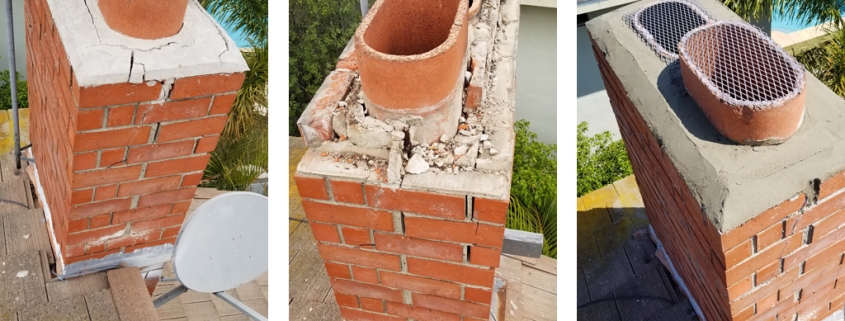Why Coastal Homes in Orange County Face Unique Chimney Repair Challenges
Coastal homes in Orange County offer picturesque views of the ocean, breezy evenings, and a relaxing environment. However, as beautiful as the coastal lifestyle may be, it comes with some unexpected challenges, especially when it comes to home maintenance. Why do coastal homes in Orange County face chimney repair challenges? The salty sea air, high humidity, and strong winds can cause accelerated wear and tear on chimneys. These conditions bring a set of unique challenges that require regular maintenance and care to avoid expensive repairs. At Lucky Sully Chimney Sweep, we specialize in chimney care, and in this article, we’ll explore the specific issues coastal homeowners face and how our expert services can help ensure your chimney remains safe and functional for years to come.
Understanding the Impact of Coastal Weather on Chimneys
Chimneys in coastal areas like Orange County face a completely different set of stressors than those in landlocked areas. The combination of high humidity, salt exposure, and strong winds creates an environment that significantly impacts the longevity and condition of chimneys. Over time, salt can corrode metal components, while moisture can weaken masonry, leading to cracks and dangerous leaks. This makes regular chimney inspections and maintenance even more critical for coastal homeowners. With proper care, a chimney can withstand these environmental factors, but neglecting to address them can result in costly repairs or replacements.
Saltwater and Its Corrosive Effects on Metal Chimneys
One of the biggest threats to chimneys in coastal regions is saltwater. The salt carried by ocean breezes can be incredibly corrosive to metal components, including flue liners, chimney caps, and stainless steel chimney liners. This exposure to salt accelerates rusting, weakening the chimney’s structure and efficiency. Over time, the metal parts of your chimney, especially the chimney cap, can corrode to the point where they no longer function properly. This corrosion can even allow water and debris into your chimney, causing further damage. At Lucky Sully Chimney Sweep, we help homeowners maintain the structural integrity of their metal chimneys by offering Chimney & Fireplace Repairs and providing advice on how to protect against corrosion.
The Constant Exposure to Moisture in Coastal Areas
Coastal areas, particularly in Orange County, are known for their high humidity and frequent rainfall. The moisture in the air constantly saturates chimney structures, which can cause significant damage over time. For masonry chimneys, the constant exposure to moisture can weaken the mortar, leading to cracks and crumbling. These cracks allow moisture to penetrate deeper into the structure, resulting in long-term issues that are difficult to repair. If the moisture freezes and expands during colder weather, it can cause the bricks to split or pop out entirely, further damaging your chimney. To avoid these problems, it’s essential to seal your chimney properly and ensure that it is waterproofed, which is one of the key services offered by Lucky Sully Chimney Sweep. Regular maintenance checks help prevent moisture from becoming a persistent problem.
The Effects of Coastal Winds on Chimney Integrity
While the saltwater and moisture are often the primary culprits when it comes to chimney damage in coastal areas, the constant winds also play a crucial role. Strong coastal winds can cause debris to accumulate in your chimney, leading to blockages and reduced airflow. These blockages can prevent your fireplace from venting properly, which is not only inefficient but dangerous. Additionally, strong winds can cause physical damage to the structure of the chimney itself. If the chimney crown or cap is damaged, it opens the door to rain and debris, causing further degradation. By having regular inspections and maintenance, you can prevent damage caused by wind and ensure that your chimney remains safe and functional.
Corrosion and Rust in Metal Chimneys
In coastal homes, metal chimneys are particularly vulnerable to rust and corrosion. This occurs because the salty air combined with moisture speeds up the deterioration of metal components. Metal parts such as chimney liners, caps, and flashing are the most affected by rust. If not maintained properly, corrosion can cause your chimney to rust through, leading to leaks and inefficiencies in your heating system. Regular inspections are essential to catch the early signs of rust before they turn into serious issues. If your chimney is showing signs of corrosion, Lucky Sully Chimney Sweep can offer expert Chimney Repair services to restore its integrity.
The Freeze-Thaw Cycle’s Impact on Coastal Chimneys
You might think the freeze-thaw cycle is something only relevant to colder climates, but coastal areas with fluctuating temperatures are also vulnerable to this problem. During the cooler months, the moisture trapped inside the brick and mortar of your chimney can freeze overnight. As the temperature rises during the day, the ice melts, causing the water to expand and contract repeatedly. This process weakens the masonry and creates cracks that will only worsen over time. In Orange County, where temperatures often shift between warm and cool, the freeze-thaw cycle can cause long-term damage to chimneys, making it crucial to schedule regular inspections to check for damage before it worsens.
Water Damage and Leaks: The Silent Chimney Destroyer
Another significant concern for coastal homeowners is water damage. Water can enter your chimney in a variety of ways, either through cracks in the masonry or from damaged chimney caps. Once water makes its way into the chimney, it can cause significant problems. The most common issue is the development of leaks, which not only affect the chimney itself but can also cause damage to the surrounding walls and ceilings inside your home. In coastal areas, where rainfall and humidity are common, these leaks can lead to rot and mold growth, posing a health risk. By having your chimney waterproofed and regularly inspected, you can avoid the consequences of water damage and preserve your chimney’s lifespan.
How to Protect Your Coastal Chimney from the Elements
Protecting your chimney from the harsh coastal elements begins with preventative measures. One of the most effective ways to shield your chimney from salt, moisture, and debris is by installing a chimney cap. A well-fitted chimney cap acts as a barrier, preventing rain, snow, and debris from entering your chimney. This is especially important in coastal areas, where the salt in the air can corrode the chimney’s metal components. Additionally, waterproofing your chimney helps protect it from moisture and reduces the likelihood of cracks and damage. By having regular chimney inspections and repairs, you can ensure your chimney stays in optimal condition.
The Importance of Regular Chimney Inspections
If you live in a coastal home, especially in Orange County, regular chimney inspections are a must. These inspections help identify issues before they become major problems, such as corrosion, cracks, or water damage. During an inspection, a trained chimney sweep will look for signs of deterioration and recommend repairs as necessary. Regular inspections can extend the life of your chimney and ensure that it remains safe and efficient. At Lucky Sully Chimney Sweep, we offer comprehensive chimney inspection services to ensure your chimney is free of hazards and in good working condition.
Conclusion
Living in a coastal area like Orange County has its perks, but it also comes with a unique set of challenges for chimney maintenance. Salt, moisture, and strong winds can significantly shorten the life expectancy of your chimney if not properly cared for. By understanding these challenges and working with professionals like Lucky Sully Chimney Sweep, you can protect your chimney from the elements and keep it running smoothly for years to come. Regular inspections, cleaning, and repair are key to avoiding costly replacements and ensuring the safety of your home and family.
FAQs
How often should I inspect my chimney if I live near the coast?
It’s recommended to have your chimney inspected at least once a year, but coastal homeowners should consider more frequent inspections to account for the increased wear and tear caused by salt and moisture.
Can a chimney cap prevent salt damage?
Yes, a chimney cap can help prevent salt, moisture, and debris from entering the chimney, offering protection from corrosion and damage.
What are the signs of rust in my metal chimney?
Common signs of rust in metal chimneys include discoloration, pitting, and visible flakes or peeling of the metal. If you notice these signs, it’s essential to address the issue immediately.
How can I prevent water damage to my chimney?
Waterproofing your chimney and installing a chimney cap are the most effective ways to prevent water damage. Regular inspections will also help detect leaks early.
What should I do if my chimney shows signs of cracking or damage?
If your chimney shows any signs of cracking or damage, contact a professional chimney sweep for an inspection and necessary repairs to prevent further deterioration.









